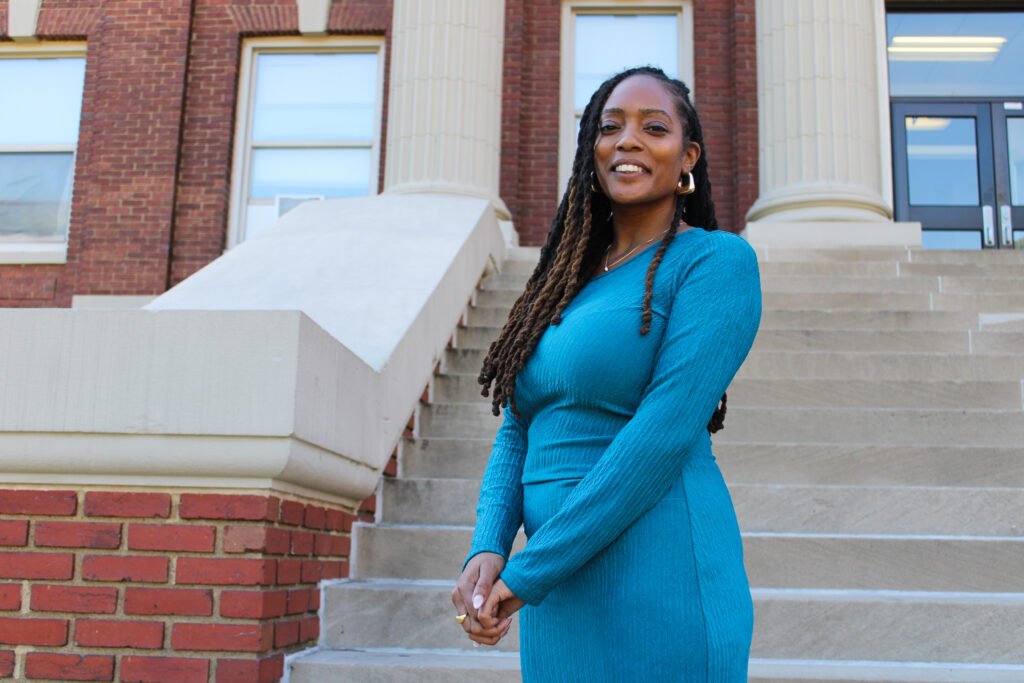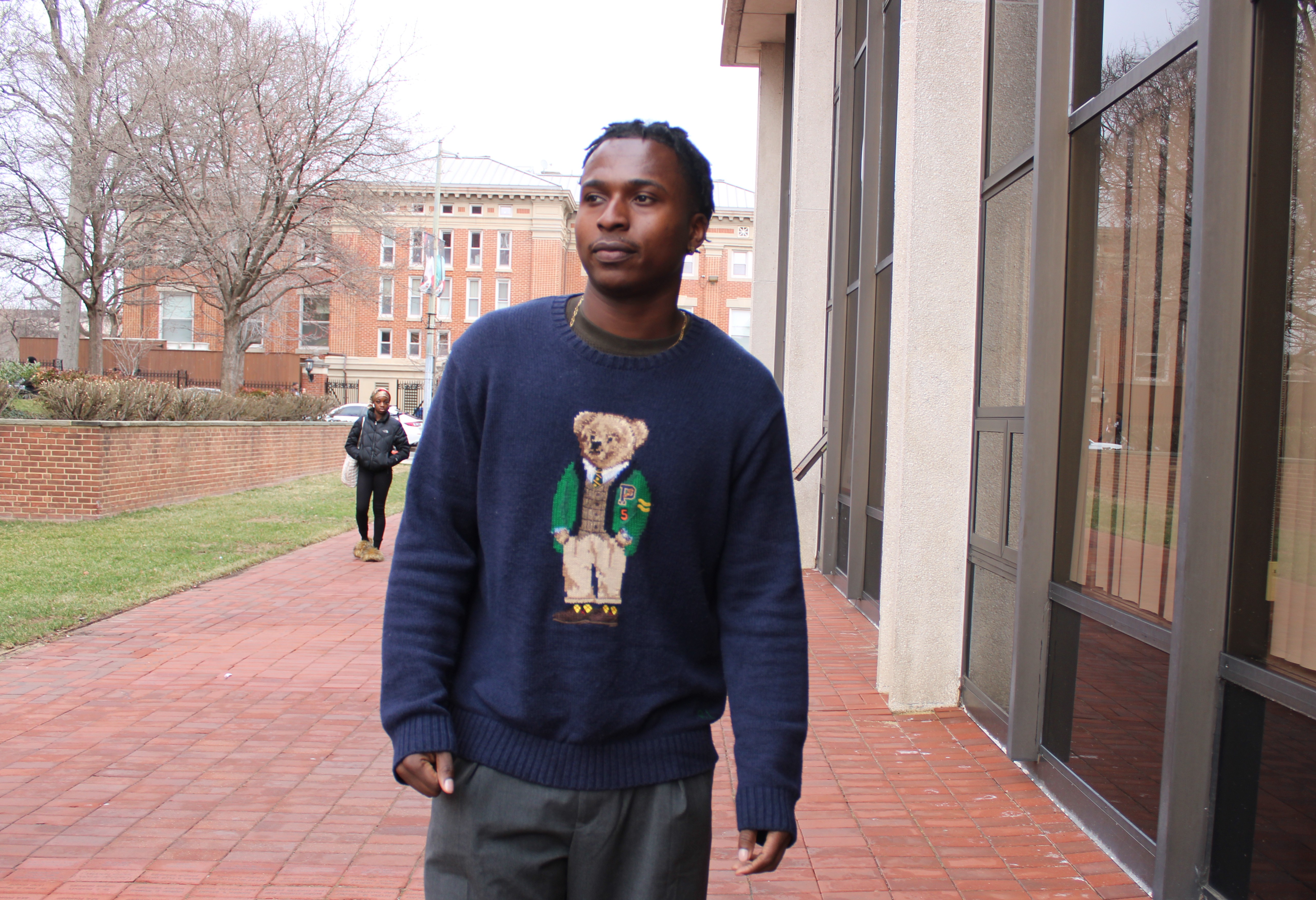WASHINGTON – Jaden Smith, a second-year master’s student in social work at Howard University, is already doing something not enough people do. He’s working in a public high school, offering what he calls “big brother love” to his students.
Smith, who started work at Bard High School Early College DC in Southeast Washington last fall while completing his degree, said he’s now doing the same “noble” work that his mother did: serving as a school social worker.
And thanks to a Howard program that aims to place social work students in schools in hopes that they’ll work there full-time when they graduate, others are doing similar work. In the program’s first two years, 22 second-year master’s students have been placed in schools in the nation’s capital to increase and diversify the school social work labor force, especially where they are needed the most.
It’s called Project PRESS, which stands for Preparing Responsive and Effective School Social Workers. And the pilot program addresses a pressing need: a shortage of social workers in schools both in D.C. and nationwide.
When Project PRESS started in 2023, there were 95 school social worker vacancies in D.C. public schools, said Sandra Jeter, an assistant professor of social work at Howard, at a panel about the project in December. And according to the School Social Work Association of America, no state in the union meets the recommended benchmark of one social worker for every 250 students.
Jeter, who launched Project PRESS with a five-year, $2.6 million federal grant, said social work programs at other universities could establish similar efforts to address the nationwide shortage of school social workers.
“I think PRESS can definitely be a model or just be an organization that offers this training to different universities that are developing social workers, whether they have a school social work focus or not,” Jeter said. “I think any university can adopt this model or work with me on expanding the model.”
Intensive training
Project PRESS aims to motivate social work students to do something many of their predecessors have decided not to do: work in schools.
“The Project PRESS program is a really exciting thing to see to get students excited about the school social work profession,” said Allie Perez, a representative of the School Social Work Association of D.C.
This yearlong program puts Howard social work students through two weeks of intensive training before they are placed at one of 11 participating schools. Students in the program receive a $10,000 stipend to ease some of the financial stresses of placement in a city school.
Social workers have different responsibilities than counselors and school psychologists. School social workers tend to work with specific students for long periods of time and create treatment or action plans.
“We do the mental health support, but we also take a more systemic view and we really focus on connecting people to resources and helping them remove barriers to those resources,” Perez said.
School counselors are more likely to focus on academic and career development compared to school social workers that are helping students with socio-emotional challenges.
A school psychologist has the ability to diagnose students and perform psychosocial assessments, Jeter said.
The services that a school social worker provides, especially to underserved students, have a trickle-down effect on how a student performs, said Gloria Cain, an assistant professor at Howard’s School of Social Work and a faculty member with Project PRESS.
“Social work is a discipline that really focuses on individuals within the context of their environment,” Cain said.
The need
Project PRESS focuses on sending students to D.C.’s Wards 7 and 8, historically Black and low-income areas located south of the Anacostia River.
Jeter said she believes these areas not only lack investment from the city but lack support rooted in the Black perspective that focuses on issues and trauma people often experience in majority Black and low-income communities.
The program focuses on culturally responsive training, which prepares program participants to engage with different student populations. It also teaches trauma-informed training, which promotes awareness of the systemic and individual trauma students carry with them so the student is not retraumatized.
Racist incidents, poverty, food insecurity and homelessness are just some of the traumas students can carry with them that impact their performance in school. A main goal of the program is to interrupt these factors and use education as a gateway to success, Cain said.
Kyaus Washington, a 2024 graduate of Howard’s master of social work program, said it’s important for social workers to know when students have experienced such traumas.
“Traumatic events happen to people and whenever you kind of understand that and try to understand from the person’s perspective, then you’re able to kind of tailor your modality to be effective based on the traumatic experience,” Washington said.
Washington works as a school-based expansion clinician at Lorraine H. Whitlock Elementary School in Ward 7. He noted negative experiences with therapists and the nation’s long history of medical racism can lead to a sense of relief when a young Black student sees a Black social worker.
“People automatically have this shared sense of community with each other,” Washington said. “If they see, you know, me, a Black man walking into the school, my Black male students could automatically connect with me from that one shared identity.”
Continued barriers
Washington keeps fidget toys and Play-Doh in his office to create a safe and fun place for students to come as a reward for good behavior.
“Students tend to like to come to my office because other people in the building are relatively hard on them,” he said. “And I’m like that safe space where you can always come in here and hang.”
Washington is among the 60% of program participants that were hired in D.C. public schools after their participation in Project PRESS. Many other students are looking to apply in schools but are facing issues with licensure, a barrier reflected across the country for Black social work students.
A 2022 report from the Association of Social Work Boards reported a 45% pass rate of the licensing exam for Black participants compared to 84% of white participants. Jeter said Project PRESS hopes to address this licensure gap through a prep course taught by Washington, along with other resources provided to students.
Social work students in Project PRESS are required to work at least 20 hours per week at their placement on top of their graduate coursework. Washington and Smith said this workload was manageable, but mentioned other students in their program felt burnout from the work.
In their students’ training weeks, they were taught mindfulness exercises and yoga to find ways to relax and have been offered other resources of support.
While at their placements, program participants are able to complete case consultations with school students, parents and teachers to address the broader issues impacting a student’s performance. They also act as sources of support for students in their caseload. Smith has helped his students find jobs or add others to his caseload if they regularly come to his office.
“When you consistently show up for them and invest in them truly, I feel like we’re going to really reap the benefits of all that as a society,” Smith said.
Project PRESS solely focuses on master’s degree students who are interested in school social work. Jeter only selects second-year graduate students for this program as she said they know where they want to be.
“We can’t just go there and get this experience and leave. It’s important for us to become a part of the community,” Jeter said. “Our students should become a part of the community even after they graduate.”
While Smith entered the master’s program unsure of becoming a school social worker, he is now planning on working in D.C. public schools after he graduates.
He sees the pipeline between Howard and D.C. public schools as necessary to give students the services that they need.
“There’s so much negative stuff, like spewing the news and stuff like that, about what was going on with the youth and everything, but there hasn’t been a lot of people who’ve been willing to offer solutions and be action-oriented,” Smith said.
Next steps
One major roadblock could stand in the way of Project PRESS, however: the Trump administration’s ban on funding for programs related to diversity, equity and inclusion.
Jeter said she hasn’t heard anything about the program’s federal grant being suspended. And while a federal lawsuit has temporarily put the DEI ban on hold, she remains worried.
“If funding cuts continue, we will have even fewer resources for vulnerable and marginalized populations, less supportive programs like Project PRESS that aim to support students pursuing careers in the helping profession like social work and education, and more strain on an already overwhelmed social services system,” Jeter said.

Faculty and students alike hope for the continuation of this program.
“For you to have something stable and consistent structured, it kind of puts your mind at peace when you have all this other school stuff to worry about,” Smith said.
A survey completed by the first-year cohort revealed 100% of respondents reported the training effectively prepared them for the hiring process and their work in schools, Jeter said. She said she believes this is a clear demonstration of how the program is accomplishing one of its goals: supporting students.
Another goal of Project PRESS is to see if the work students are doing in their placements is having a trickle-down effect on issues like tardiness or school suspensions, Cain said.
This program is close to Jeter’s heart, not only for her attachment to D.C. public schools but for what the program can mean for future generations.
“My nephews and nieces are being educated in D.C. schools now, and so I know when I was younger and experienced anxiety and depression I didn’t have a social worker,” Jeter said. “I’m happy that I’m a part of the process to get at least my niece and nephew support if they would ever need it.”


You must be logged in to post a comment.